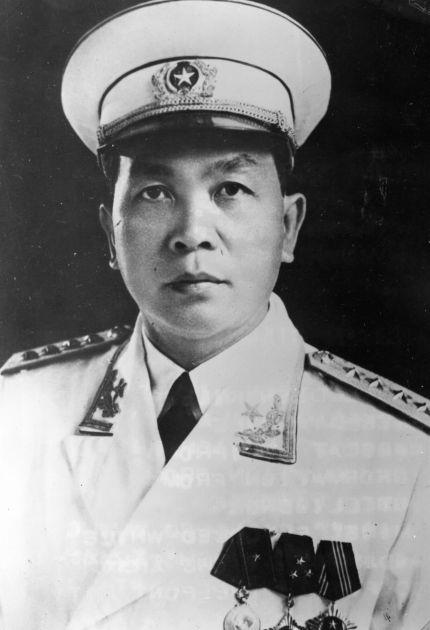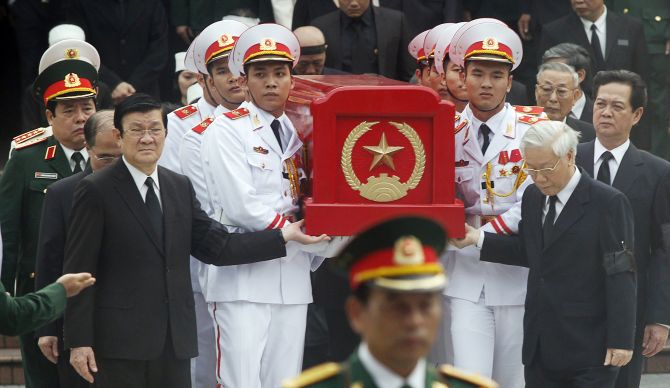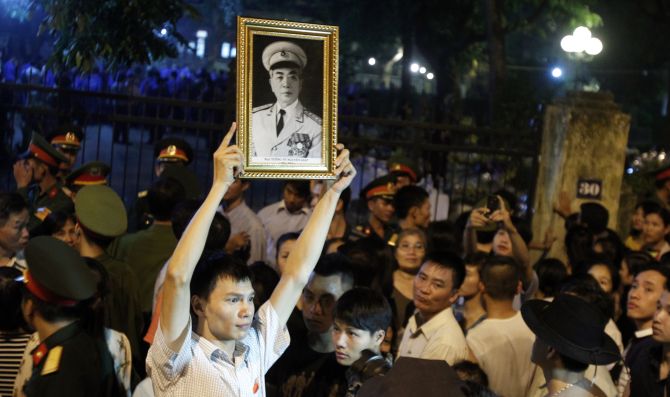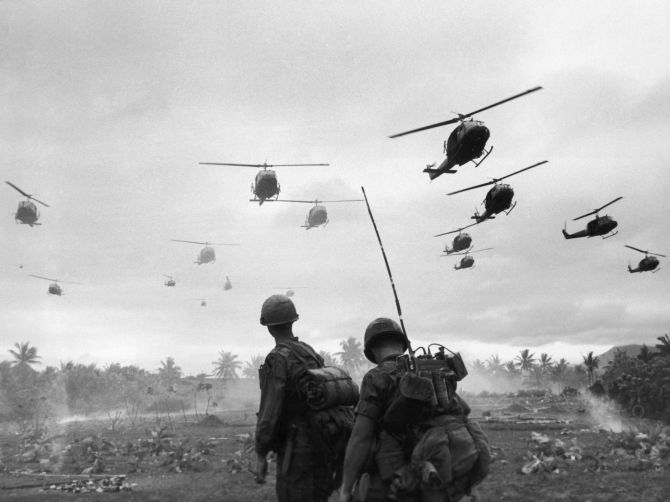Photographs: Getty Images Colonel Anil A Athale (retd)
No contemporary military figure comes anywhere near General Vo Nguyen Giap in the sheer scale of achievements, says Colonel Anil A Athale (retd).
Military geniuses are a rare phenomenon. While there have been thousands of great artists, scientists and even philosophers, the list of military geniuses does not exceed a score of over a dozen.
General Vo Nguyen Giap of Vietnam, who died at the ripe old age of 102 earlier this month, will certainly make it to that illustrious list.
The reason why warfare is such an exacting art is that unlike in any other human endeavour, in war there are no silver medals for coming second best. Neither is there an opportunity to correct one's mistake in time and a military genius has to have an uncanny ability to out-think the adversary, understand his own men, geography, technology and psychology, a tall order.
General Giap's military achievements are greater than many of his 20th century counterparts as he triumphed over extraordinary odds.
In his lifetime he led tiny Vietnam to victory over the French, the Americans and a defensive victory over the Chinese (the border conflict of 1979 to 1984).
No contemporary figure comes anywhere near him in sheer scale of these achievements.
Please ...
'Long live General Giap'
Image: Vietnamese President Truong Tan Sang, front, left, and Prime Minister Nguyen Tan Dung, right, along with other leaders and soldiers carry the coffin of the late General Vo Nguyen Giap during his funeral in Hanoi.Photographs: Reuters Colonel Anil A Athale (retd)
General Giap had many run-ins with the ruling Communist party leadership in his later years -- notably over his opposition to the bauxite mining that affected the environment.
But such was the reverence of the people of Vietnam to their war hero that a reluctant leadership was forced to accord him State honours.
As his coffin passed crowds in the capital Hanoi, the people of Vietnam gave him a hero's farewell. 'Long live General Vo Nguyen Giap,' people chanted and many burst into tears as his flag-draped coffin passed by on a truck-drawn artillery carriage.
As an aside, as a former soldier of the Indian Army, one cannot but recall with sadness the less than deserving farewell that the Indian establishment gave to our own war hero -- Field Marshal S H F J Manekshaw in June 2008.
Please ...
He led the first successful non-European movement against a modern Western power
Image: A man holds up a portrait of General Giap while gathering outside his home to pay homage in Hanoi.Photographs: Kham/Reuters Colonel Anil A Athale (retd)
General Giap shot to fame during the decisive battle of Dien Bien Phu that lasted from March 13 to May 7, 1954. During the Second World War that preceded the first Indo-China war, the Vietnamese Communist party under the legendary Ho Chi Minh fought the Japanese occupiers and on the side of the Allies.
Yet after the war, instead of independence, the French tried to re-impose colonial rule. Fearful of the Vietnam going Communist, the Americans gave material support to the French. The French counter-insurgency campaign was successful in establishing control over the cities.
The countryside, however, remained firmly in the hands of VietMinh guerrillas. The VietMinh, using classic guerrilla tactics, operated in small groups and never provided the French a large enough target to use their conventional arms superiority.
Unknown to the French, the VietMinh were building up their artillery and preparing to openly confront the French thanks to the support of the Russians and the Chinese.
French General Henri Navarre built up almost a division strength force at Dien Bien Phu with the aim to attract the VietMinh forces and annihilate them.
Using primitive means of transportation like cycles and ox carts, the VietMinh guerrillas surrounded the French garrison. The VietMinh used the technique of tunnelling their way forward.
As the perimeter at Dien Bien Phu continued to shrink, even the air supply became scarce. The starving and demoralised soldiers, 11,000 of them, ultimately surrendered to the VietMinh on May 7, 1954. Interestingly amongst them were soldiers from the famed French Foreign Legion, mostly of German origin who belonged to the Nazi divisions.
France's defeat in Indochina damaged its prestige elsewhere in its colonial empire. The defeat in Indochina served to spur independence movements in other colonies. In 1954, six months after the battle at Dien Bien Phu ended, the Algerian War started, and by 1956 both Moroccan and Tunisian protectorates had gained independence.
A military historian wrote that Dien Bien Phu was the first time that a non-European movement had evolved through all the stages from guerrilla bands to a conventionally organised and equipped army able to defeat a modern Western power in a pitched battle.
Please ...
The American bombing in Vietnam was thrice bigger than the entire Second World War
Image: A 1967 photograph showing a wave of US combat helicopters during the Vietnam War.Photographs: Patrick Christain/Getty Images Colonel Anil A Athale (retd)
General Giap showed his mastery of logistics when he concentrated close to 25,000 troops to surround the garrison at Dien Bien Phu. His tactics of using extensive tunnelling to advance and various measures to protect his forces from air power were to be seen later in the Second Indo China war against the Americans.
The battle of Dien Bien Phu delivered the coupe-de-main to the French empire in South East Asia. In the Geneva accord of 1954, the French withdrew from Indo-China.
As an Indian this is akin to what we did at Dacca (now Dhaka) on December 16, 1971. Interestingly, both in the case of Vietnam as well as Bangladesh, the bulk of the French and Pakistani armed forces were still undefeated when the surrender came. The Pakistani forces in Bangladesh had enough ammunition and supplies to last over six months.
It is the psychological blow that the battle of Dien Bien Phu delivered to French morale that tilted the balance. The credit of the victory certainly goes to General Giap.
The Second Indo-China war is possibly the most brutal war in human history so far. In this war the US sprayed 76 million litres of Agent Orange, a crop killing substance (the current American hullaballoo over Syrian use of chemical weapons is cute).
The Vietnamese Red Cross estimates 150,000 children were born with birth defects as a result, and up to 3 million were exposed to it. Many were maimed and killed by napalm bombs.
The American bombing campaign in Vietnam was three times bigger than the ENTIRE bombing effort during the Second World War.
The United States Air Force dropped in Indochina, from 1964 to August 15, 1973, a total of 6.1 million tonnes of bombs on Vietnam. This is three times the figure for the entire WWII (including the atomic bombs of Hiroshima and Nagasaki).
This tonnage was dropped on a population of 32 million, thus the Americans dropped bombs worth several hundred kgs per capita.
That a nation survived all this is tribute to the tenacity of its people. But to triumph against such brutal enemy was surely an extraordinary feat.
The military leadership of General Giap, his tactical acumen and strategic vision was fully in view during this war.
Before one assesses his contribution to the war effort it will be necessary to have a background about the start of the Vietnam war, which I will explain in the next part of this tribute to General Giap.





article